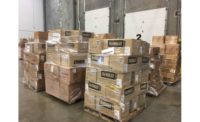 Natural disasters are the top safety concern among office employees, yet the majority of businesses (60 percent) polled in a survey said recent disasters -- including Hurricane Sandy -- haven’t led them to reassess their safety plans.
Natural disasters are the top safety concern among office employees, yet the majority of businesses (60 percent) polled in a survey said recent disasters -- including Hurricane Sandy -- haven’t led them to reassess their safety plans.
The survey by office supply company Staples discovered significant discrepancies between safety perception and actual preparedness. Only half of employees said their company communicates a safety plan – a basic tenet of safety preparation – but, three out of four believe their businesses take safety seriously. In emergency situations, nearly 25 percent of employees report their companies only communicate what to expect “at the last minute.”
Smaller companies at bigger risk
Furthermore, according to survey results, small businesses appear to be more at risk for safety concerns than medium-sized businesses. Specifically:
- Less than half of small businesses said they are prepared for severe emergencies or that safety plans are communicated regularly.
- Thirty-eight percent said their small business does not have safety training or drills.
- Medium-sized businesses were more likely to have plans in place for emergencies such as evacuation (90 percent), shelter in place (46 percent) and building lockdown (56 percent).
- Medium-sized businesses reported a wider array of safety equipment on-site.
“Staples knows that businesses take safety seriously in order to protect their greatest assets: employees,” said Bob Risk, senior strategic safety, health and wellness manager, Staples. “With an expanded assortment of safety supplies, from first aid kits, fire extinguishers and personal protective equipment to ergonomic furniture and technology accessories, Staples offers solutions to help businesses keep workers safe, healthy and productive.”
Tips for getting prepared
Staples recommends these additional steps to help prepare for emergencies and maintain a safe work environment:
- Stock up on emergency items: In addition to an emergency evacuation plan, business should have enough food, water, flashlights and blankets to help sustain employees for up to three days. Items like masks and crank-powered radios can further help businesses be ready for any emergency.
- Help prevent accidents: The second foremost safety concern among survey respondents was trips, slips and falls. Prevent accidents by installing floor matting and placing hazard signs where appropriate.
- Be mindful of ergonomics: One-third of respondents experience pain or discomfort at their workstation and a quarter reported “numbness” or “tingling.” Providing ergonomic equipment helps prevent workplace injuries.
- Back up data: One quarter of respondents do not have access to a secure server for data back-up. To help protect data and make it accessible, consider using a secure VPN, cloud storage and external hard drives.


